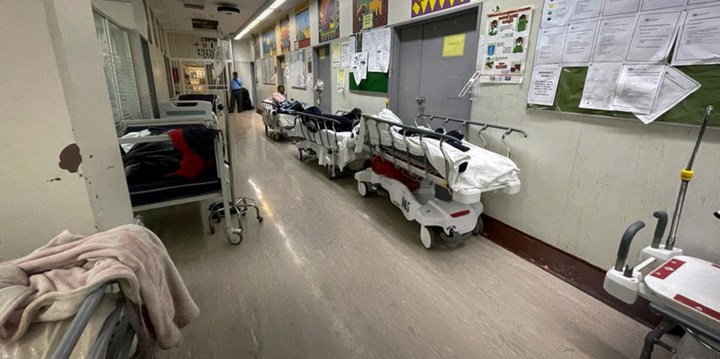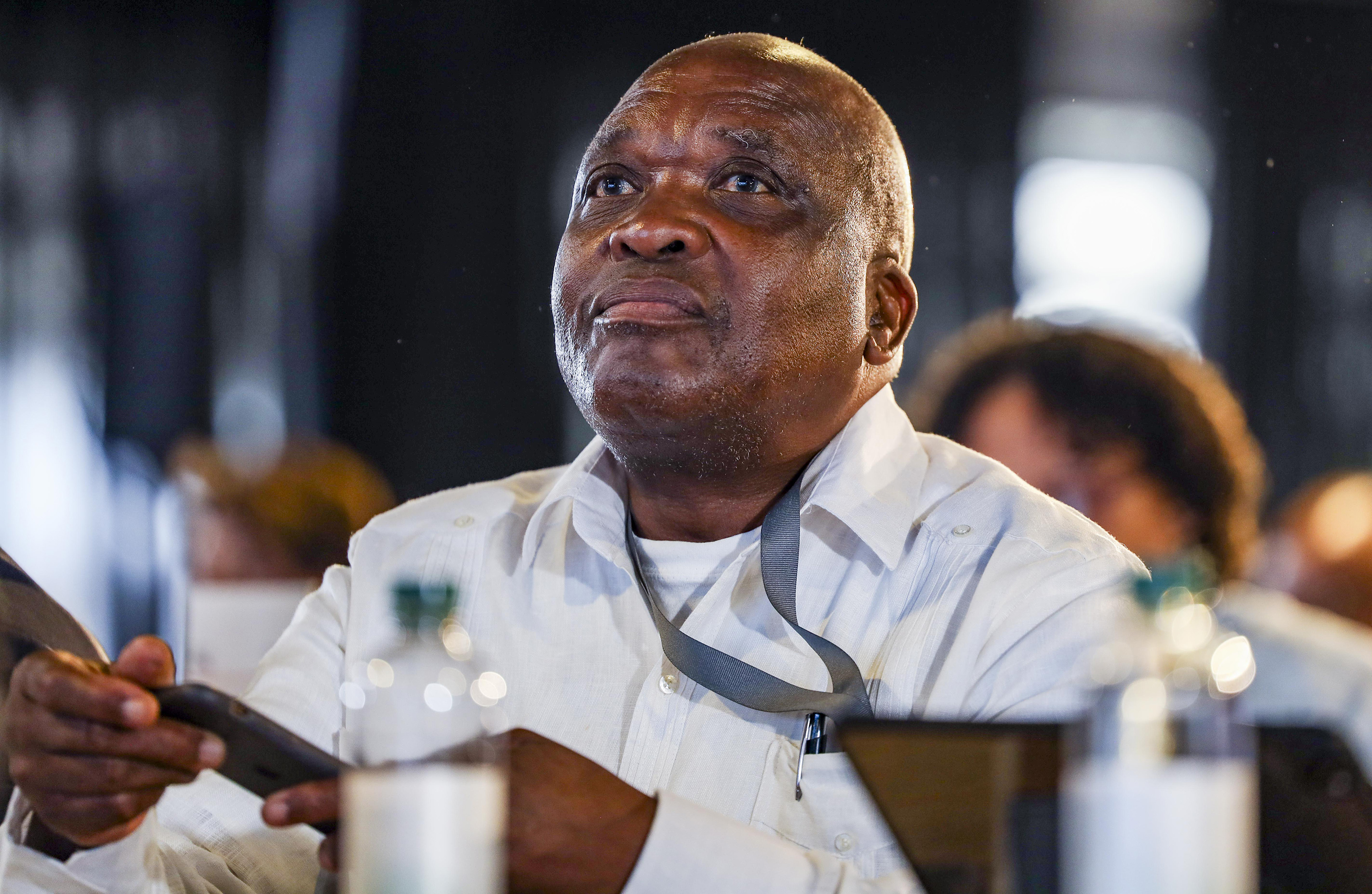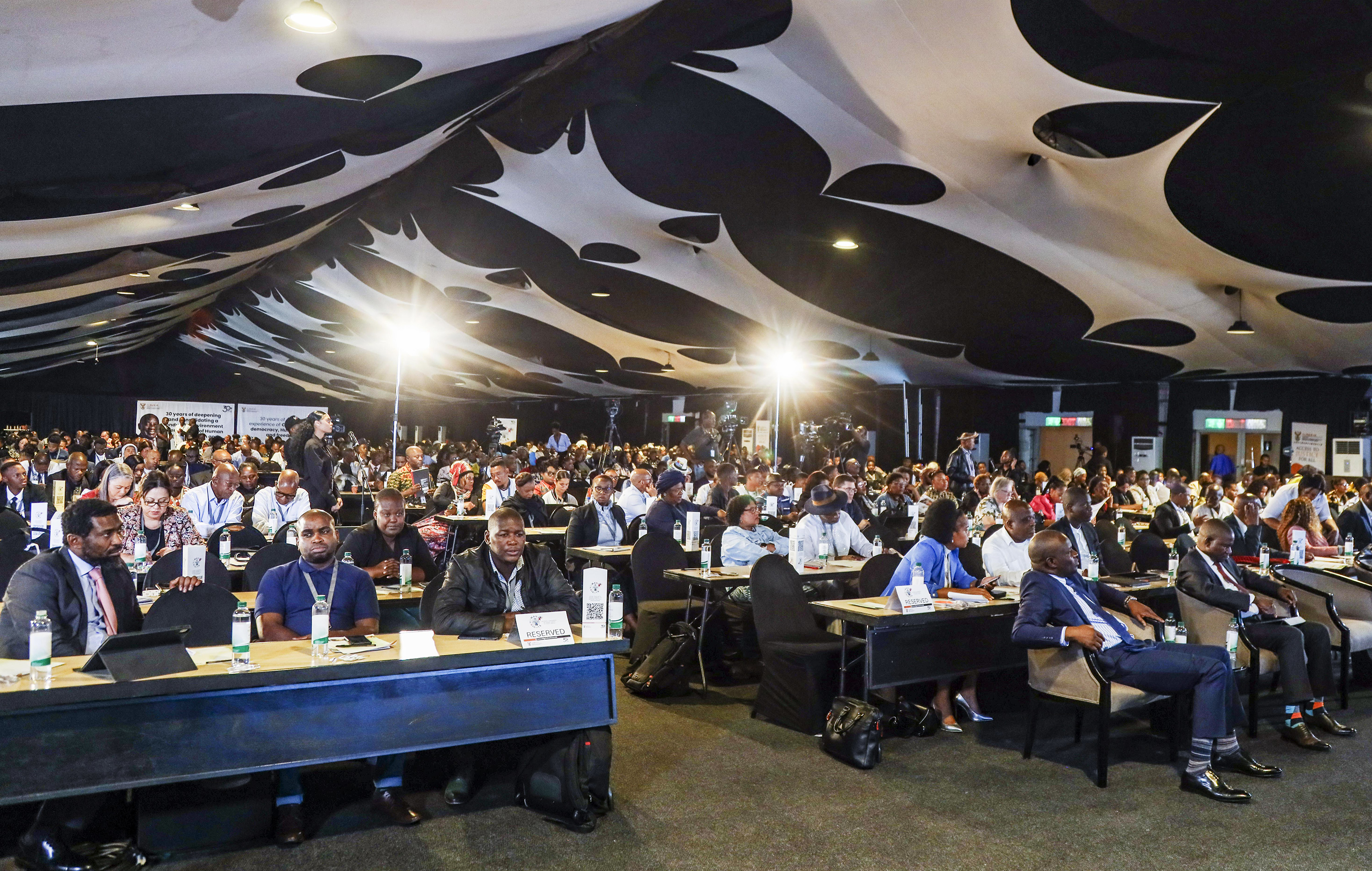ACCESS TO CARE
‘Stop defunding our health system,’ rights summit panellists say as SA takes stock of 30 years of democracy

From increased access to healthcare services to an integrated national health system, South Africa is far from the fragmented and discriminatory healthcare system of apartheid. But while genuine progress has been made, panellists at the National Human Rights Conference acknowledged that the current system could be faring much better.
‘If we want to realise rights, if we want to use health as an intervention tool to fight poverty, fight inequality and improve people’s quality of life, we need to stop disinvesting in health. We need to invest in health. We need to allocate sufficient funds. We need to spend those funds properly and stop the theft,” SECTION27 executive director Sasha Stevenson said on day two of the Department of Justice and Constitutional Development’s National Human Rights Conference on Tuesday.
Stevenson was giving input during a roundtable discussion about how access to healthcare and social security can be a critical tool for fighting poverty and improving living conditions.
While South Africa’s healthcare system has transformed since 1994, the reality is that health facilities are crumbling because they are underfunded and crippled by corruption and maladministration.
This is why government officials, dignitaries and civil society are gathered at the Birchwood Hotel and OR Tambo Conference Centre in Boksburg for the three-day conference. It aims to take stock of the strides made in the fight for human rights and critically evaluate what more needs to be done to ensure all people in South Africa live in dignity as the nation celebrates 30 years of democracy.

Health Minister Dr Joe Phaahla at the Human Rights Conference held at the Birchwood Hotel and Conference Centre in Boksburg on 19 March 2024. (Photo by Gallo Images / OJ Koloti)
‘What then went wrong?’
Opening the discussion on access to healthcare and social security, panel facilitator Dr Phophi Ramathuba said democracy brought a breakthrough for the healthcare industry.
She recounted how the homeland system before 1994 fragmented healthcare, resulting in unequal quality of care and discrimination based on race, geography and even tribe.
“But Mandela’s administration was able to amalgamate the different departments of health into one national Department of Health in a short space of time, and that was a breakthrough that needs to be celebrated. What, then, went wrong?” Ramathuba asked.
Read more in Daily Maverick: ‘Much to be done’ – Ramaphosa acknowledges challenges to human rights in SA
Health Minister Dr Joe Phaahla detailed the government’s efforts to transform healthcare since 1994, adding that the attainment of good health services was part and parcel of the liberation struggle.
Reading from the Africans’ Claims document drafted by the ANC in 1943, Phaahla said: “We regard it as a duty of the state to provide adequate medical health facilities for the entire population of the country. We deplore and deprecate the fact that the state has not carried out its duty to the Africans in this regard and has left this important duty to philanthropic and voluntary agencies.”
The document called for a drastic overhaul and reorganisation of the healthcare system, an aspiration the democratic government has taken on and spearheaded, the minister claimed.
Some monumental successes of the democratic dispensation included then president Nelson Mandela’s proclamation that pregnant women and children under the age of six would receive free medical care at all public health facilities.
Phaahla said the proclamation was implemented immediately, and a few years later the government decided that all services at all public primary healthcare facilities would be provided free of charge.
Since 1994, the government had also put policy in place ensuring no one seeking care was turned away from a public healthcare facility, and no one could be denied emergency care from any healthcare facility in the country, public or private.

Justice Minister Ronald Lamola at the conference in Boksburg on 19 March 2024. (Photo: Gallo Images / OJ Koloti)
The government had also ensured that as many people as possible had access to healthcare facilities by implementing a massive infrastructure programme in which district and regional hospitals, teaching hospitals and clinics had been built across the country.
“Major steps were taken to increase access to public health services to improve their quality and health outcomes. But you also have to acknowledge that over the same period of three decades there’s also been increased inequality,” Phaahla added. We have created opportunities for a two-tier health system: One for those who have sufficient income, and public health, which looks after those with low income or who are unemployed.”
The health sector was also facing a number of challenges which were slowing progress in making equitable and quality healthcare for all a reality.
These included chronic underfunding of the healthcare system, and unstable and inappropriate management at various levels of the system.
“But I think the biggest challenge to our system today, 30 years down the line, is the fact that we have not been able to close the gap, which our forebears in 1943 and also in 1952 had already identified in terms of making sure that we close the gap between access and quality of access to health services by those who have income and those… who have low income and [are] unemployed.”

Human Rights Conference attendees at the Birchwood Hotel and Conference Centre in Boksburg on 19 March 2024. (Photo: Gallo Images / OJ Koloti)
‘Huge asset’
Taking stock of the past 30 years, Stevenson praised South Africa’s current healthcare system, which glows compared with the one under apartheid, which systematically underfunded large groups of the country and catered mainly to the white minority.
“I think we need to recognise straight up-front that we have a huge asset in our public health system. We have training infrastructure. We have health facilities at every level, from primary healthcare to specialist level. There are so many problems in the system, and there are so many inequities. But the system itself is an asset and actually puts us in quite a different position to many other countries, including countries on the continent that are trying to develop towards universal health coverage,” Stevenson said.
She said South Africa’s combination of a large public healthcare system, which can be harnessed to improve access for everyone, and a strong private sector that caters to a small portion of the population on medical aid, gives the country a key advantage.
Stevenson echoed Phaahla’s statements that while a lot has been achieved in the healthcare system, there is room for improvement.
“We need to stop defunding our health system. It’s not just that we’re underfunding our health system. What we are doing is actively defunding the system. We are actively instituting budget cuts. We are not spending the money that gets allocated. We are mismanaging some of the money that gets allocated. And rife corruption means a sizeable proportion of the health budget just gets stolen,” she said.
Stevenson added that the recent budget cuts mean the nation is spending less money per patient in the public healthcare system, which inhibits the quality of care.
Read more in Daily Maverick: Tertiary hospital professionals sound the public healthcare alarm after severe national budget cuts
The budget cuts affected more than just the health facility infrastructure grant, which meant provinces were limited in how they could improve health infrastructure as facilities crumbled.
South Africa had a healthcare workers crisis where not enough were employed at facilities, while medical graduates sat at home, unable to get jobs.
“This year’s Budget saw a real decrease of two-and-a-half percent in employee compensation. That means we can’t employ new healthcare workers, and the minister has to juggle overtime and new graduates to the market. It makes it impossible for us to staff our health system in the way we need it,” Stevenston said.
Real reform now
Echoing the authors of the Africans’ Claims document, and Phaahla, Stevenson called for systemic reform of the national health system.
“We have to stop the stalled health system reform efforts. Talk of NHI has taken up the last two decades. The bill has passed. It contains real drawbacks that have been ignored for political reasons. But they’re ignored at our peril because there are real problems in that bill,” Stevenson said.
Two decades of ruminating about the National Health Insurance Bill had stalled real health system reform. Policies could be implemented immediately that would improve the system and better prepare it for an NHI.
Read more in Daily Maverick: The NHI debate is throwing up misconceptions – here are the facts
“We need to push health reform that will actually show results that will show results now and into the future and that will build the trust that we’ve systematically broken down over the last decades. Doing so, I suggest, will enable us as a country to build on the past 30 years and to make the right to health real for everyone in South Africa,” Stevenson added. DM



















Funding is not our problem, efficacy of spend is.
Compare our health spend as percentage of GDP with China India and then compare outcomes by way of measures such as change in life expectancy, infant mortality, etc. Hint : we spend more but perform far worse.
Part of our misspend is layer upon layer of admin. A researcher once told me we spend more on administrators across national, provincial, local levels than we do on doctors and nurses.
I don’t know how much they paid to get together and have this circle jerk and discuss what is obviously wrong with the health care system, but I could have saved them a bit of money. I could have taken one of them to work with me for the day. They would get a birds eye view of what it is like for a patient, nurse or doctor accessing or working in Healthcare facilities. Then they could have taken the money spent on entertaining these people for 3 days and invested it in a proper queing system for our patients, then they wouldn’t have to be in queues from 4am in the morning and only be done by 2 pm. Or we can spend it on an extra nurse or two for that understaffed ward. Or how about an extra doctor so that there is more than just one doctor covering his department at night? When are we going to stop discussing our problems in this country, and actually do something about them?
I have no doubt that most nurses and doctors care. Nor that they are banging their head against a failed system of administration. Health systems should be devolved. You will very quickly spot that 90% local systems function well devolved and that you must fire them people that run the other 10%
This useless anc governmunt has done everything to keep focus on the “evils of apartheid ” all the while systematically destroying and thieving the medical resources to continually BLAME APARTHEID as justification